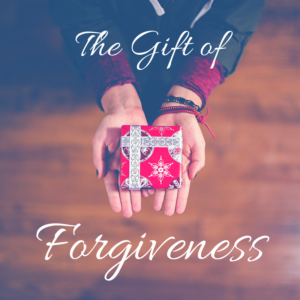The Gift of Forgiveness
The most valuable gift you can give to yourself this holiday season is the gift of forgiveness.
Why Forgiveness?
Many of us carry unresolved issues from the past. It might feel like carrying a heavy ball and chain. It can be anger from a minor slight or the rage of a major grievance. We all experience the heaviness of carrying the load of anger after we have been unfairly hurt. Research has shown that forgiveness is linked to mental health symptoms such as depression, anxiety, and other mental health issues.
The pain can replay in our minds like a bad movie. We think about things we wished we had said or done differently. We think about other outcomes or different endings. We fantasize about what life would be like if it had played out in another way. These hurts can take over like a thick blanket covering your entire body. The grief can come from others, or from an internal self-bully that is carried around inside of us and beats us up regularly.
This is where choice comes in. We have a choice on what we spend our time thinking about each day. How much space in our minds do we want to devote to the past and the painful events that left us scared and angry? Ask yourself, “Do I want to let this go or hang on to it?” You may find it helpful to get out a pen and paper and make a chart of “Pros” and “Cons.” The results might surprise you.
You have a choice.
Suggested Practices
The best gift you can give yourself is to set your agony free. Try letting go of it for one day. Then one week. Then one month. Practice letting it go. If a thought pops up, you can say, “Leave! You are no longer a part of my life.” See what happens.
Forgiveness is a process. Like any habit, it takes time to develop and take hold. Once you establish a habit, you can let go of the grief, creating more room in your life for the things that bring you peace and joy. It may be helpful to take out your “Pros and Cons” list to review when you’re finding it challenging to let go. By simply reviewing the list, you separate yourself from the feelings and create distance; this gives the feelings less power and you are more able to let go and spend your energy on what is important to you.
Meditation and mindfulness can be your guide on this road to forgiveness. A regular practice of meditation and mindfulness can retrain your mind to let go of the things that are not serving you. Over time you will see that negativity no longer has a strong hold on you. A daily meditation practice will have lasting effects. There are excellent guided free meditations online to help you get started. Here are a couple of my favorites:
- Mindful.org 10 Minute Guided Meditation on Forgiveness
- Calm.com Forgiveness Meditation ($)
- Deepak Chopra Guided Meditation on The Law of Intention
Another recommended practice is starting a forgiveness journal. Writing about past pains and obstacles can be cathartic. Write a letter to yourself on why you want to be free of this pain. This self-healing practice can have a profound effect on your life.
Painting, drawing, music, or any form of creativity you enjoy can help to release past hurts. Simply ask the question “Why am I holding on to this?” You can ask yourself this question while you engage in your creative outlet. Continue this as a practice and set time in your daily calendar to make space for this exercise.
Therapy or a support group can allow for further work on forgiveness. Either by connecting with peers or seeking individual support to dive deeper into letting go can allow for greater growth.
Lastly, another question you may want to ask yourself is, “What would my life look like if I let go of the story of this pain? How would my life change?” See what your answers are.
Forgiveness is a form of self-care. The better we take care of ourselves the more profoundly we can heal. This is the ultimate gift we can give to ourselves.
Written by Jennifer Eckert, LICSW
Boston Post Adoption Resources
